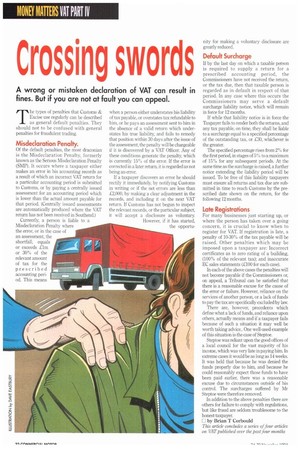Crossing swords
Page 24

If you've noticed an error in this article please click here to report it so we can fix it.
A wrong or mistaken declaration of VAT can result in fines. But if you are not at fault you can appeal.
The types of penalties that Customs & Excise use regularly can be described as general default penalties. They should not to be confused with general penalties for fraudulent trading.
Misdeclaration Penalty.
Of the default penalties, the most draconian is the Misdeclaration Penalty, formerly known as the Serious Misdeclaration Penalty (SNIP). It occurs where a taxpayer either makes an error in his accounting records as a result of which an incorrect VAT return for a particular accounting period is submitted to Customs, or by paying a centrally issued assessment for an accounting period which is lower than the actual amount payable for that period. (Centrally issued assessments are automatically produced where the VAT return has not been received in Southend) Currently, a person is liable to a Misdeclaration Penalty where the error, or in the case of an assessment, the shortfall, equals or exceeds £1m or 30% of the relevant amount of tax for the prescribed accounting period. This means when a person either understates his liability of tax payable, or overstates tax refundable to him, or he pays an assessment sent to him in the absence of a valid return which understates his true liability, and fails to remedy that position within 30 days after the issue of the assessment, the penalty will be chargeable if it is discovered by a VAT Officer. Any of these conditions generate the penalty, which is currently 15% of the error. If the error is corrected in a later return, it is regarded as not being an error.
If a taxpayer discovers an error he should rectify it immediately, by notifying Customs in writing or if the net errors are less than £2,000, by making a clear adjustment in the records, and including it on the next VAT return. If Customs has not begun to inspect the relevant records, or the particular subject, it will accept a disclosure as voluntary. However, if it has started, the opportu nity for making a voluntary disclosure are greatly reduced.
Default Surcharge
If by the last day on which a taxable person is required to supply a return for a prescribed accounting period, the Commissioners have not received the return, or the tax due, then that taxable person is regarded as in default in respect of that period. In any case where this occurs the Commissioners may serve a default surcharge liability notice, which will remain in force for 12 months.
If while that liability notice is in force the Taxpayer fails to render both the returns, and any tax payable, on time, they shall be liable to a surcharge equal to a specified percentage of the outstanding tax, or £30, whichever is the greater.
The specified percentage rises from 2% for the first period, in stages of 5% to a maximum of 15% for any subsequent periods. At the same time as the surcharge is raised, a further notice extending the liability period will be issued. To be free of this liability taxpayers must ensure all returns and tax due are submitted in time to reach Customs by the prescribed date shown on the return, for the following 12 months.
Late Registrations
For many businesses just starting up, or where the person has taken over a going concern, it is crucial to know when to register for VAT. If registration is late, a penalty of 10-30% of the tax payable will be raised. Other penalties which may be imposed upon a taxpayer are: Incorrect certificates as to zero rating of a building, (100% of the relevant tax); and inaccurate EC sales statements (£100 for each case).
In each of the above cases the penalties will not become payable if the Commissioners or, on appeal, a Tribunal can be satisfied that there is a reasonable excuse for the cause of the error or failure. However, reliance on the services of another person, or a lack of funds to pay the tax are specifically excluded by law.
There are, however, precedents which define what a lack of funds, and reliance upon others, actually means and if a taxpayer fails because of such a situation it may well be worth taking advice.. One well-used example of this situation is the case of Steptoe.
Steptoe was reliant upon the good offices of a local council for the vast majority of his income, which was very late in paying him. In extreme cases it would be as long as 14 weeks. It was held that bemuse he was denied the funds properly due to him, and because he could reasonably expect those funds to have been paid earlier, there was a reasonable excuse due to circumstances outside of his control. The surcharges suffered by Mr Steptoe were therefore removed.
In addition to the above penalties there are others for failure to comply with regulations, but like fraud are seldom troublesome to the honest taxpayer.
17 by Brian T Corbould This artick concludes a series of four articles on VAT published over the pasl four months






































































































